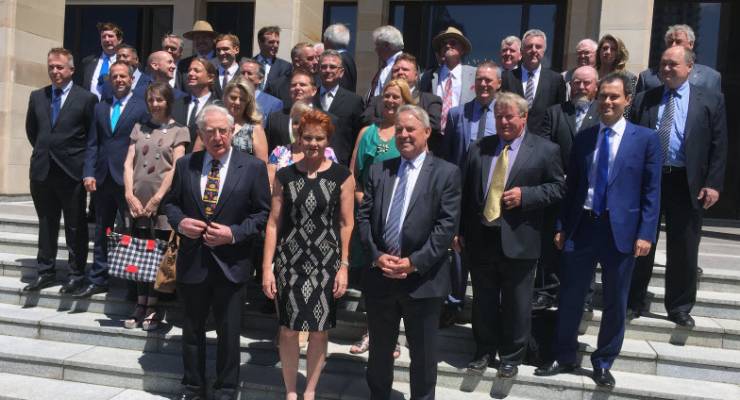
Much has been written over the past several months about the grumbles, grizzles and outrage of former One Nation candidates regarding the manner in which they were disendorsed by Pauline Hanson’s party. The angst and anger is deeply felt. It has been on public display with emails flying left, right and centre, which, in some cases, have included language that would not be used in polite company (or even moderately impolite company).
What is not well understood is to what extent the procedures One Nation uses to endorse and disendorse candidates are — or aren’t — in accordance with the relevant constitutions that have been lodged with the Western Australian Electoral Commission (WAEC) and the Electoral Commission of Queensland.
The constitution lodged with the Electoral Commission of Queensland is a public document, while the other constitution — the one that seems to be actually governing the state-based affairs of Pauline Hanson’s One Nation (PHON) in WA — remains a secret. People know it exists, but the WAEC is refusing to hand over a copy to former candidates. Requests in writing from Crikey for a copy of the document remain unanswered.
Crikey is aware that no member or candidate was provided with a copy of the constitution for the WA branch of PHON upon joining the body. In other words, it left people in the dark about their rights as members.
[Disendorsed One Nation candidates unleash on Hanson and Ashby]
In both states, we are looking at an unincorporated association, which is simply a group of people organising for a joint objective: to promote policies and get people elected to Parliament. This means that every member is entitled to understand the rules under which the organisation is being run. Plus, in any properly constituted organisation, there is always an avenue of appeal before someone is expelled or disendorsed by that organisation.
Imagine playing football, tennis, cricket or rugby without having access to the rules of the game. How do you keep score? Under what circumstances do players get a free? What constitutes a reportable offence on the pitch or court? Club administrators, coaches, players or umpires could not function without an understanding of what the rules were, irrespective of the sport being spoken of. Imagine attempting to resolve a dispute between individuals or the group overall without access to the rules related to dispute resolution, discipline, endorsement and disendorsement.
Inside sources tell Crikey the template on which the secret WA constitution was prepared at the time of their involvement was the version of the New South Wales constitution. According to this document, the candidates should have been subject to an interview by no fewer than a panel of 10 people for their preselection processes. They should have delivered a speech in front of the selection panel. This was never done. Similar provisions exist in the Queensland constitution and the process contained in that constitution was also not followed.
Both the NSW constitutional template and the active Queensland constitution have an appeal mechanism for people being disendorsed. These procedures were not followed in the cases of Shan Ju Lin, Peter Rogers or Elise Cottam in Queensland. There was no appeals process or process of natural justice followed in the case of the disendorsed WA candidates such as Sandy Baraiolo, Dane Sorensen and Stephen Piper.
Crikey understands that other areas of governance have fallen into disrepair. According to sources, there has been no annual general meeting for One Nation Queensland Division — which is the actual entity that bears the PHON business name — for several years, despite the constitution mentioning the need to hold AGMs as well as ensure members receive a report on financial affairs, receive audited accounts, appoint branch or state executives and also appoint an auditor.
Members deserve to know about the financial state of the organisation in which they hold an interest, and they are entitled to have at least one occasion a year where the association’s affairs are discussed with them.
[Rundle: jumpin’ around with One Nation and the micros at the election after-party]
Clause 6.4(b) of the Queensland division’s constitution states that branch treasurers shall present an audited financial statement for the previous financial year. The constitution also requires the AGM for a branch to be held between July 1 and August 31 of each year with 21 days given to members of a meeting.
It is extraordinary that any organisation should leave it for so long to provide members with an insight into what they are doing with member funds and what activities the organisation plans to undertake in the coming year.
Even more curious is the fact that it appears to have been forgotten that members are more than just cheap labour on polling day or possible candidates to be thrown at the public to help the party achieve a required percentage of the vote to boost the coffers.
They each individually have the same rights in the association as any other member, as well as the same exposure to liabilities should the association be hit by a sizable legal payout.
A 70-year-old grandmother, for example, who has purchased a membership of PHON has the same rights as Senator Pauline Hanson in such an unincorporated body.
This coming Monday, Four Corners presents a report on One Nation’s governance issues and the party’s “brutal backroom politics”. Perhaps then we’ll get some answers.








Crikey is committed to hosting lively discussions. Help us keep the conversation useful, interesting and welcoming. We aim to publish comments quickly in the interest of promoting robust conversation, but we’re a small team and we deploy filters to protect against legal risk. Occasionally your comment may be held up while we review, but we’re working as fast as we can to keep the conversation rolling.
The Crikey comment section is members-only content. Please subscribe to leave a comment.
The Crikey comment section is members-only content. Please login to leave a comment.